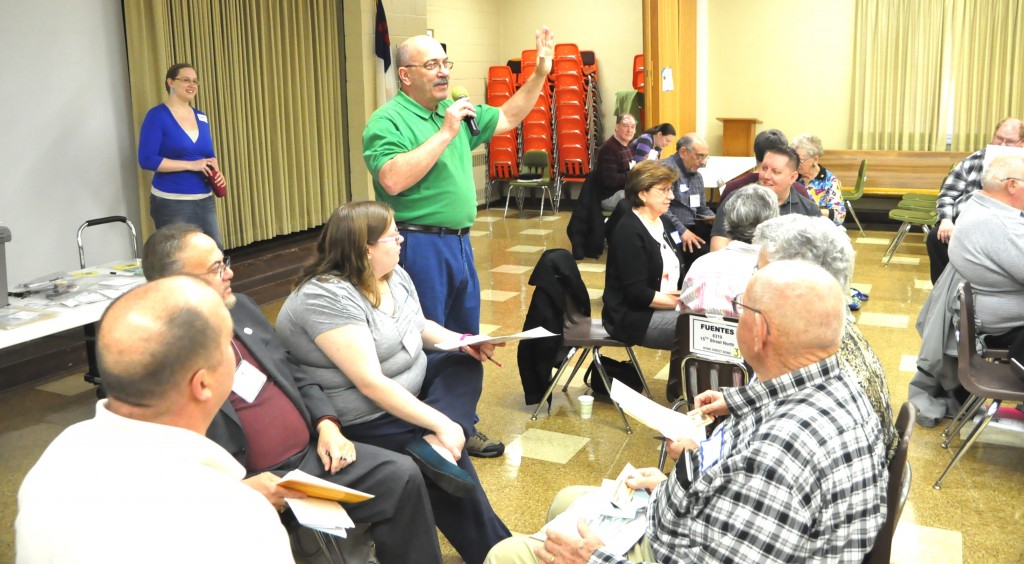 Girl,Poverty,PleaseHelpSign
Girl,Poverty,PleaseHelpSign
A devotional for the Northeast District’s Tools for Ministry Poverty Simulation, March 12, 2016 by the Rev. Candy LaBar
My friends, we live in a foolish world. (Well, at least as scripture describes it.) Why do I say that? Because of Proverbs. In Proverbs 18:2 we read:
2 A fool takes no pleasure in understanding,
but only in expressing personal opinion.
Am I right? A foolish world? In our world, there seem to be so many people who are willing– no, not willing…eager–to offer up a personal opinion. But so few people are committed to seeking understanding. And that, Proverbs tells us, is foolish.
Today, what you are doing is anything but foolish. You all have gathered here today because you seek understanding. You seek some deep understanding about something that was crucially important to Jesus, something that is inextricably connected to the gospel. It’s something that our churches must address if we want to be relevant and gospel-focused. It’s something that has an untold impact on our world, something that too many people are forced to confront every single day. Today, you are seeking understanding about poverty.
It’s my hunch that most of you did not grow up in poverty, that most of you have not spent a significant portion of your lives struggling in the midst of poverty. I would guess that if pressed, most of you would identify as “middle class.” Am I right? Maybe “upper middle class” or “lower middle class”… but middle class just the same.
Now, that doesn’t mean that you have a lot of money. That doesn’t mean you’ve never struggled. That doesn’t mean that you’ve never had to worry about money. That doesn’t mean you’ve always had enough to pay the bills.
But there are differences in this country between being “struggling middle class,” and struggling in the midst of poverty. There are differences with regards to how you interact with community agencies, how you understand banking and spending and saving, how you view your resources. But it’s more than that.
I grew up middle class. I continue to identify as middle class. I haven’t personally experienced poverty. I have listened to enough stories, though, to know that people who live in poverty often have two very similar experiences, at least as they’ve shared them with me:
- “Living” in a way that is really all about surviving, about being besieged by the “tyranny of the moment” and struggling to survive that moment. Survival is the focus.
- Knowing that you are one crisis – one major medical issue, one busted car engine, one whatever – one crisis away from total collapse.
I’ve experienced stress in my life, and I’ve experienced stress with regards to bills and money… but as a person who has always been able to identify as “middle class,” I haven’t experienced that stress. I haven’t felt what that’s like.
A few years ago, though, I attended a poverty simulation led by none other than Art Piancone, our simulation leader for today. I’ll admit, I didn’t exactly go for all of the right reasons. I went because they were offering free CEUs, and I needed some of those. I went because it was being held at a church that was less than 3 miles from my house, so that was easy. I went because it felt like I, as a pastor, should probably know more about what’s going on in my community. (That’s a slightly more noble reason than the others, I suppose.) I went because it would only last for a few hours, just in the morning, and I could give up one Saturday morning and still have the rest of the day to myself.
I didn’t go because I was seeking some deep understanding about poverty. We talked about poverty all the time at my seminary. I thought I knew about poverty. I was wrong.
My experience at that poverty simulation was invaluable. I won’t be so conceited or deluded as to say that those two hours led me to fully understand what it means to live in poverty… but I gained some amazing insights.
I glimpsed some of the stress and desperation that people in poverty often experience. I began to grasp why the people coming to my church for assistance seemed to be coming with frustration and what I mistakenly took to be hostility. I found a context for interactions in my life that I had previously misunderstood. I left with more understanding, and that’s not even what I was seeking in the first place. Sometimes, God gives us more than what we seek.
Elsewhere in Proverbs, we read:
1 My child, if you accept my words
and treasure up my commandments within you,
2 making your ear attentive to wisdom
and inclining your heart to understanding;
3 if you indeed cry out for insight,
and raise your voice for understanding;
4 if you seek it like silver,
and search for it as for hidden treasures—
5 then you will understand the fear of the Lord
and find the knowledge of God. (Proverbs 2:1-5, NRSV)
It doesn’t sound like there are many better ways to spend a Saturday morning, right? There aren’t too many better ways to spend our time than to spend it seeking the valuable treasure of understanding… especially understanding something like poverty.
Some eight centuries ago, a faithful Christian named Francis – who later became better known to the world as St. Francis – penned a prayer that has become famous and has proven to be timeless. Francis wasn’t a United Methodist (though we won’t hold that against him), but his prayer has been included in our hymnals. It reads:
Lord, make me an instrument of thy peace;
where there is hatred, let me sow love;
where there is injury, pardon;
where there is doubt, faith;
where there is despair, hope;
where there is darkness, light;
and where there is sadness, joy.
O Divine Master,
grant that I may not so much seek
to be consoled as to console;
to be understood, as to understand;
to be loved, as to love;
for it is in giving that we receive,
it is in pardoning that we are pardoned,
and it is in dying that we are born to eternal life. (UMH 481)
Hear part of that again: “grant that I may not so much seek… to be understood, as to understand.” In this time, and in this place, and in this simulation, may we put our thoughts and assumptions aside.
May we let go of trying to make other people see our perspective. And may we spend this precious time together, seeking nothing more than to understand… to understand what it means to struggle in poverty, and to understand what the church can do to be in ministry with those who are in poverty.

